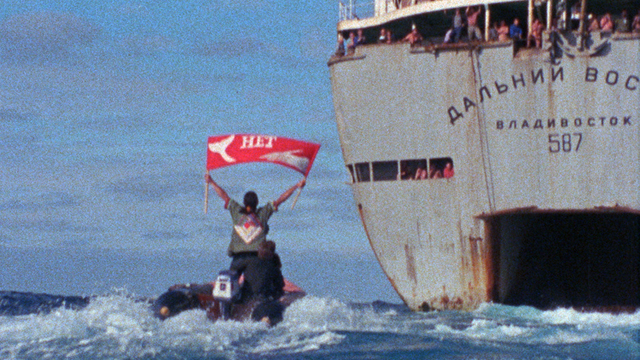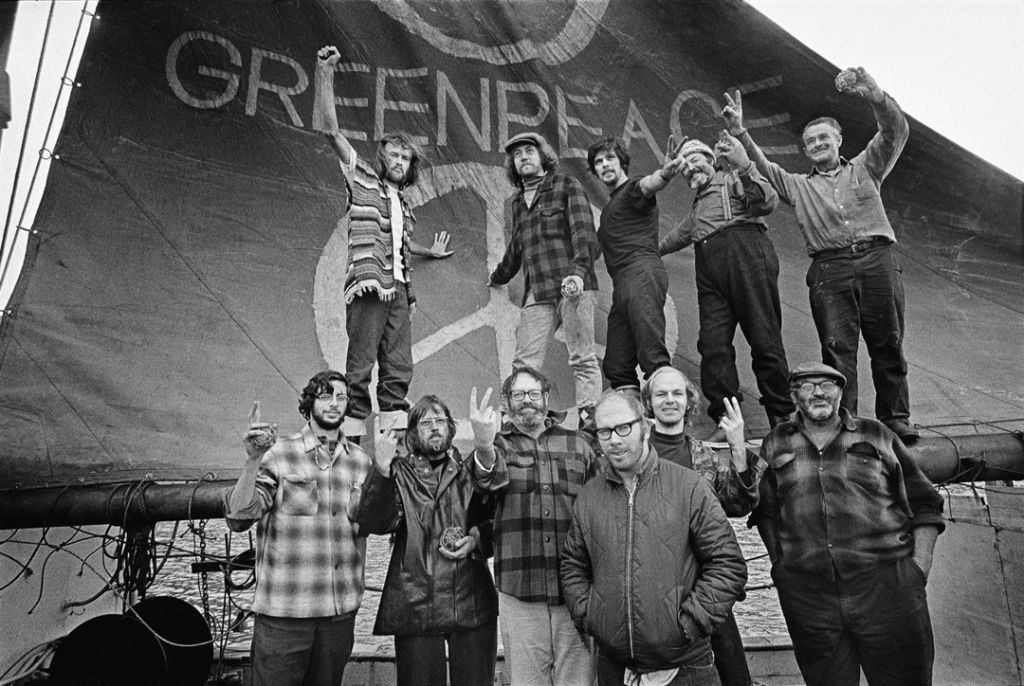Long before Twitter’s Arab Spring images helped topple governments or Al Gore’s laser pointer alerted us to the earth’s spiraling temperatures, a ragged band of Canadians took a fishing boat into the frigid waters of the North Pacific Ocean in 1971 to try to stop a nuclear weapons test on the island of Amchitka. With that action, they started the environmental group Greenpeace and, in addition to saving many a whale, revolutionized political activism and advocacy journalism.
How to Change the World, a new documentary directed by Jerry Rothwell, tells that history with reams of archival footage, first-person interviews, and narration using the words of the deceased activist/journalist Robert Hunter, a guiding force of the organization. The film, like the subject it covers, is not candy-coated; it includes the foibles of these pioneers who erred along the way, especially when they succeeded. This past week, the documentary premiered at the Sundance Film Festival, where Rothwell discussed How to Change the World over email.
Tom Roston: Why did you get involved in this subject?
Jerry Rothwell: A project I was doing involved me doing research in the Greenpeace archives and I realized there were multiple old cans of 16mm shot on the original campaign boats that had pretty much not been opened for 40 years. I’m really interested in the way groups and movements grow, and Greenpeace went from a few people in a boat in 1971 to a global organization by 1978. So I started wondering how much that footage could tell the story of the group; a few individuals who had a massive impact on defining the modern environmental movement and methods of protest. That took me to the books of Robert Hunter about that period in Greenpeace’s history. Hunter’s books are a searingly honest, and often comic, take on events, and they provided me with a narrative shape for the film.
Roston: Have you ever been politically active?
Rothwell: Yes, in my youth I was involved in nuclear disarmament and other activist groups and I guess I see all my filmmaking as political, in the broadest sense of the word.
Roston: You co-directed the superb Deep Water, which follows a man’s misadventures at sea. Are you drawn to maritime tales or is this just a coincidence?
Rothwell: I think it’s a coincidence. Both films were made without really getting wet. But the sea is obviously a great space for cinematic stories — a boat is a hothouse for drama between people or between an individual and nature.

Rex Weyler approaches the Russian whaling mother ship, 1976 (Film still, Greenpeace International Film Archive)
Roston: The dynamic between activism and journalism is embodied by the life of Bob Hunter. Which do you think is more effective at changing the world? Have you had to reconcile the two in your career? How?
Rothwell: Hunter went from being a journalist to becoming an activist and the leader of a movement. I think by that time, for him, journalism was secondary to the larger purpose of the environmental movement. For me, I don’t set out for my films to have a campaign message or a call to action, which I think diminishes their meaning and relevance. I’m interested in the kind of filmmaking that draws an audience into a complex story, where they have to make their own judgments about what forces are at work in the story (and in the world), and how to respond to them when they leave the cinema. You have to analyze, empathize with and understand a situation before you can act, and I think that’s the role of cinema. Films on their own don’t change things, until people take action as a consequence of them.
Roston: Could you describe what you consider to be one of the greatest accomplishments of Greenpeace? And one of its greatest failures?
Rothwell: I think without Greenpeace’s work in the 1970s many species of whale would be extinct. The moratorium against whaling in 1982 was achieved directly because of the way the early whale campaigns had changed global consciousness about whales. It drastically reduced the number of whales being killed from the 7000 a year quotas of the time, which were pushing species towards extinction.
I guess a failure is that it has created a model of protest that superficially seems over-biased towards capturing images. In fact, Greenpeace has always campaigned upon many fronts — through political lobbying, mass media and direct action. But in the public mind, the power of the images it created in the ’70s might leave us to believe that ‘bearing witness’ is enough.
Roston: I am no fan of spoilers but it may be better for viewers to know before they see the film that you don’t refer to the bombing of the Rainbow Warrior. Why?
Rothwell: The Rainbow Warrior bombing by the French secret service happened in 1985. My film takes place between 1971-78 (with an epilogue about what some of the individuals involved have done since) — so, as historians say, the bombing, though great drama, was ‘not my period.’
Roston: Your inclusion of interstitial titles (“Fear success”), along with the title of the film, suggest you are giving directions to today’s activists, whether they’re Occupy Wall Street types or climate change activists. Is this film a how-to guide for today’s activists?
Rothwell: No. The title is a little tongue in cheek, as are the interstitials, drawn from Bob’s writings, which act as chapter headings. I think there’s a lot to learn from the early Greenpeace experience but the film isn’t intended to be a how-to guide. It’s an exploration of one attempt to effect change by a small group of people and of the impact of their success on the people in that group and their relationships.
Roston: Could you compare how today’s media landscape has either amplified or minimized grassroots activism since the birth of Greenpeace?
Rothwell: Whereas Greenpeace in the ’70s was focused on capturing single images (for example, of people risking their lives to save a whale from a harpoon) which would be networked around the world on television, I don’t think it’s possible for an image to have the same impact in today’s media landscape, because of the sheer quantity of images we are subjected to. Our tool today has to be the network rather than the image and our ability to create and share ideas, data, opinions and images across those networks to mobilize them is more where the power lies.
Roston: Is the Greenpeace organization involved in any way in the film? What is its take on it?
Rothwell: Greenpeace was hugely helpful in allowing us to access its archive from the 1970s. But part of our agreement with them was that they had no editorial control over the film (or funding of it). We couldn’t have financed the documentary if funders had thought it was a Greenpeace promotional piece. It’s critical of Greenpeace in parts, though I think overall audiences are inspired by what the founders of Greenpeace achieved.
Roston: Are you optimistic about the current state of climate change and our hopes of curtailing it?
Rothwell: It’s hard to be optimistic, because of the political inertia in dealing with the problem, and the set of interests aligned against changing the way we do things in order to protect the climate. In the end, we won’t have any choice but to act, but the later we leave it, the more chaos and human suffering will be caused.
Roston: If you have any of the activists who are in the film nearby with you at Sundance, would you mind having them answer the following: what’s one of the biggest misperceptions of the birth of Greenpeace and does this film help correct that?
Emily Hunter (Daughter of Robert Hunter): That it was male dominated; there were a lot of women behind the scenes… The film shows the crucial roles of Carlie Truman and Bobbi Hunter, two of the early women activists in the group.
Bobbi Hunter: I think we were looked upon as hippie rabble-rousers, but the reality was that we were all accomplished people in out own right — doctors, lawyers, scientists, journalists, etc.
Here’s a clip from the film that shows how the crew consulted the I Ching before going out to sea in search of the Russian whalers.




